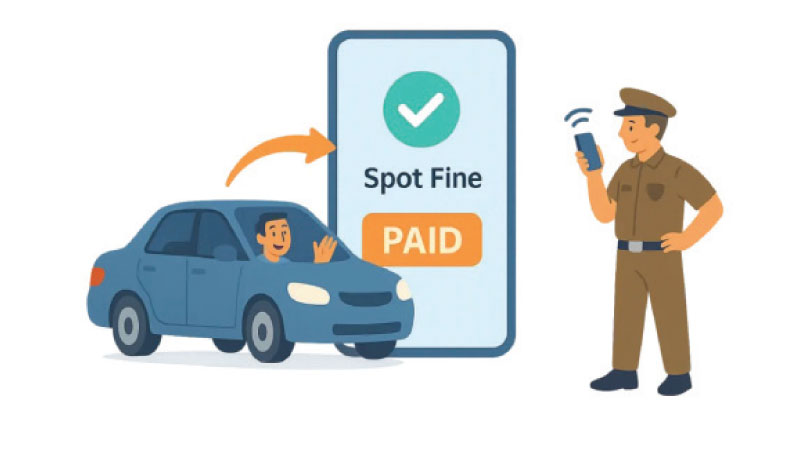 In a significant move towards digitising public services and improving transparency, Sri Lanka has launched a pilot project enabling the online payment of traffic fines via the GovPay mobile application. The initiative, which kicked off on April 11, aims to modernise the process of paying traffic fines — a long-standing hassle for motorists — by eliminating time-consuming visits to post offices and reducing opportunities for bribery.
In a significant move towards digitising public services and improving transparency, Sri Lanka has launched a pilot project enabling the online payment of traffic fines via the GovPay mobile application. The initiative, which kicked off on April 11, aims to modernise the process of paying traffic fines — a long-standing hassle for motorists — by eliminating time-consuming visits to post offices and reducing opportunities for bribery.
The pilot program, due to run until April 30, covers key roads across Kurunegala, Doratiyawa, Melsiripura, Gokarella, Galewala, Dambulla, Madatugama, Maradana, Kadawala, Kekirawa, Thirappane, Kavarakkulama, and Anuradhapura. Eleven police stations along the Kurunegala–Anuradhapura corridor are participating in the project.
“This system represents a major shift in how we handle traffic violations,” said ICTA Board Member Harsha Purasinghe at a media briefing at the Department of Government Information. “Our aim is to provide a hassle-free, transparent, and efficient experience for the public.”
Until now, motorists who received a traffic fine had to pay it at a designated post office and then present the receipt at the relevant police station to retrieve their driver’s licence. The new system permits digital payment using the GovPay platform, enabling immediate clearance of fines and swift return of licences.
A digital detour from inconvenience
The GovPay app simplifies the entire process. Motorists select the Sri Lanka Police from a list of Government institutions on the app, choose the “Vehicle Fine” option, and enter key details. A simplified list of traffic violations makes the process easier to navigate. Multiple fines can be settled in a single transaction, and the total amount is calculated automatically.
Each police station is equipped with a mobile device connected to the GovPay system. After a payment is processed, an electronic receipt is generated and an SMS alert is sent to the officer, who then releases the licence without delay.
“In the past, drivers would lose valuable time travelling to pay fines and collect licences,” said founder of Helakuru and a contributor to the system’s development, Danika Perera. “Now, with GovPay, the process can be completed on the spot, often within minutes.”
The new system significantly reduces the cost of compliance. “Previously, post offices charged a 10 percent service fee on fines. For example, a Rs. 1,000 fine meant paying Rs. 1,100. With GovPay, it’s just a flat Rs. 15 fee regardless of the amount,” Perera added.
Challenging the culture of corruption
Stakeholders said the digital transition could mark a turning point in the ongoing fight against petty corruption. Drivers and enforcement officers have long been part of a system where informal payments — bribes — became an accepted norm to avoid the cumbersome official process.
Chairman of the Three-Wheeler Association, Sudil Dilruk welcomed the change, calling the system “very user-friendly.” According to him, most traffic fines are issued to three-wheeler drivers, who often operate across districts. “If a driver from Ratnapura is fined in Badulla, they had to travel back just to get their licence,” he said. “Now, they can settle everything digitally and be done with.”
He also outlined how the inefficiencies of the previous system created a breeding ground for bribery. “Drivers were tempted to pay a bribe simply to avoid the headache. This, in turn, encouraged some officers to expect such payments. With GovPay, that excuse is gone.”
Chairman of the Private Bus Owners’ Association, Gemunu Wijeratne, echoed this sentiment, adding that the simplicity of the system will reduce stress for drivers and conductors, although some may take time to adjust.
A step towards broader reform
The system has also received backing from policymakers and civil society.
“This is a practical, cost-effective step in curbing corruption,” said Member of Parliament Lakmali Hemachandra,. “Bribery thrives in systems with too much red tape and too little oversight. Digitising transactions eliminates both.”
Hemachandra said that reducing corruption is among the Government’s top priorities, and digital solutions such as GovPay play a critical role in achieving that goal.
Co-Convenor of the Citizens’ Constitutional Council, Vimukthi Dushantha agreed, calling the initiative a reflection of global best practices.
“We must move in step with global digital governance trends. Systems such as GovPay save time, increase accountability, and help restore public trust,” he said. “The quicker we implement this nationwide, the better.”
Looking ahead
Officials said the pilot phase will help identify any refinements before the platform is expanded countrywide. A user-friendly leaflet explaining the payment process is given along with fine notices.
If successful, GovPay could become a model for digitising other aspects of public service, helping the country transition from cumbersome manual processes to a more agile, tech-enabled future.
For now, at least, motorists in the pilot districts are getting a glimpse of what a more streamlined, less corrupt traffic enforcement system might look like.




